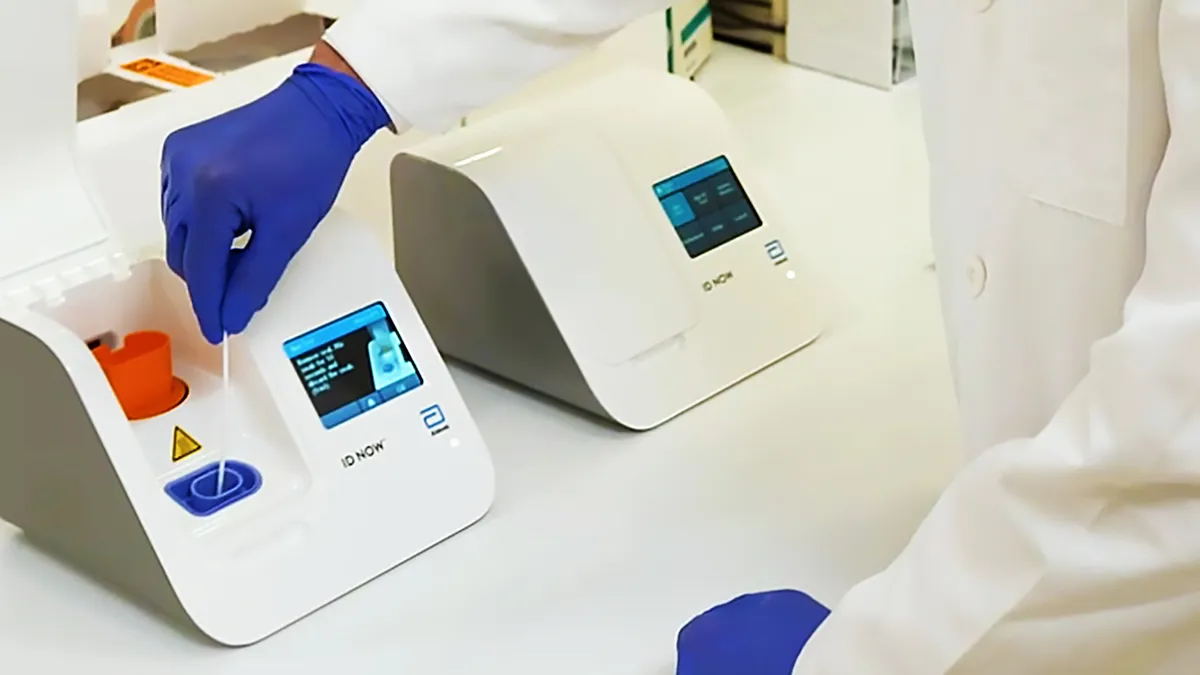Dive Brief:
- FDA on Tuesday issued a letter formally amending the instructions for using Abbott's emergency use-authorized ID Now point-of-care coronavirus test to reflect a process change that may improve test accuracy.
- The update to instructions for the month-old EUA says swabs placed in viral transport media solution prior to processing in the machine should not be used "due to concerns that the dilution will result in decreased detection of low positive samples that are near the limit of detection" of the Abbott test, FDA said in its letter clearing the change sought by the company.
- The changes came as some healthcare providers questioned the test's accuracy rate. The Cleveland Clinic conducted a head-to-head, internal quality assessment comparing five COVID-19 testing platforms and found Abbott's POC test to have the lower sensitivity and a higher false negative rate.
Dive Insight:
Abbott was not the first company to get emergency use authorization for a point-of-care coronavirus test — Cepheid claimed that milestone. But the potential for Abbott's test to detect positive cases in five minutes and negative results in 13 minutes, as well as the company's claim its ID Now machines were the most widely available molecular POC testing platform in the country, made its EUA a hopeful step for U.S. coronavirus testing infrastructure.
At the time of the EUA, Abbott did not share data on accuracy of the test. A spokesperson said "performance was established by testing a limited number of contrived samples," and performance characteristics would continue to be collected in the field.
The recent Cleveland Clinic assessment, reported by NPR and confirmed by the medical center to MedTech Dive, looked at more than 200 specimens and assessed five testing platforms. Both Abbott's ID Now test and Diasorin's Simplexa assay had lower sensitivities and higher false negative rates than counterparts, which Cleveland Clinic said may make them better suited for use in "an ambulatory setting or areas with a low prevalence of disease."
"We have studied the quality of multiple traditional and rapid testing platforms to review the performance characteristics of tests that are in-use, as well as those being considered for use," a Cleveland Clinic spokesperson said in an email to MedTech Dive. "It is important to assess the quality of each test to ensure the most accurate results are available to help inform providers on how best to use these assays in the clinical setting."
The issue was also reported on by STAT, which highlighted a validation analysis at the University of Pittsburgh Medical Center that also found some individuals with lower loads of the virus received a false negative result from the test.
Updating the instructions for use to ensure samples aren't diluted in viral transport media may help cut down on the rate of Abbott tests that deliver false negatives, which Cleveland Clinic told NPR was about 14.8% in its study.
"Last week, when we identified that viral transport media could be diluting samples, we immediately communicated with our customers that they should use the direct swab method. When the direct swab method is used, the test is performing as expected and we are confident in its performance," an Abbott spokesperson said in an email to MedTech Dive.
Of the 40-plus emergency use authorizations given to commercial labs and test kit manufacturers, around a quarter have an amendment letter. Those changes, often to instructions for use, can reflect anything from the addition of new compatible instruments, extraction methods, or transport media, among other changes.
Abbott CEO Robert Ford said on an earnings call last week it had manufactured at least 50,000 of the ID Now tests every day since April 1, and had provided authorities at the city, state and federal levels with daily reports on "what we’ve made and where we’ve shipped the product." Abbott said it's selling the coronavirus tests for the same price as other assays that run on the ID Now machines for illnesses like strep and flu.
The initial priority with ID Now was to test frontline healthcare workers, "and as we start to ramp up manufacturing for ID Now as we’ll start to implement those actions in the month of May into June, we’ll start to roll this out into a second phase where we’ll start to be able to test more of the general population," Ford said. CVS and Walgreens expanded their drive-thru testing services this month using the test.
Abbott's latest coronavirus testing frontier is serology testing, a method to detect antibodies produced by people infected with the virus. The company began rolling out a test last week meant to detect an antibody known as IgG, a protein produced in the blood later during the course of infection. California Gov. Gavin Newsom said Wednesday his state is ordering 1.5 million of the serological tests from Abbott. The company is now working on a test that can detect IgM, which may indicate more recent exposure to the virus.












